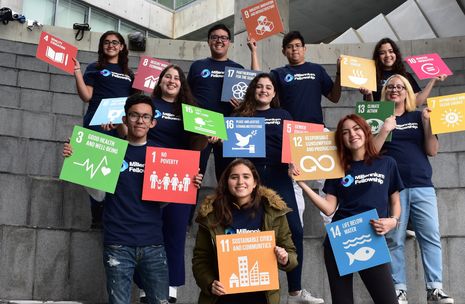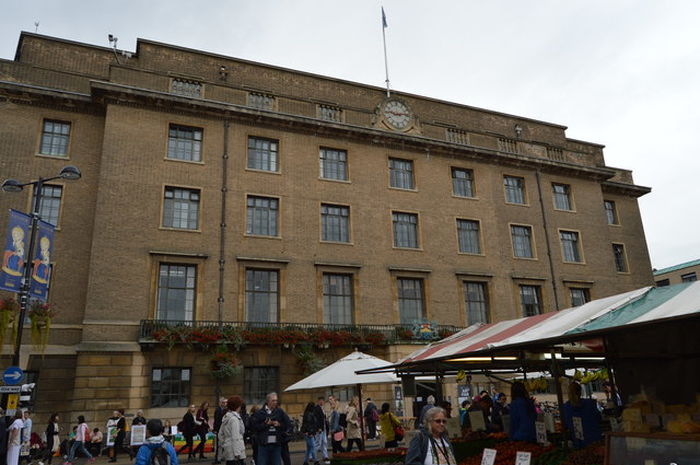Cambridge chosen as a campus for 2020 UN Millennium Fellowship
12 undergraduates from Cambridge will participate in the 2020 UN Millennium Fellowship, a program which “convenes, challenges, and celebrates” student leaders working towards UN goals

Cambridge is one of 80 academic institutions which has been chosen to host a cohort of Millennium Fellows.
The Fellowship, as described by a press release, is “a semester-long leadership development program that convenes, challenges, and celebrates student leadership for UN goals”. From August to December, Millennium Fellows work to put the UN’s Sustainable Development Goals (SDGs) and United Nations Impact Principles (UNIP) into action.
This year, 15,159 students applied from 1,458 campuses across 135 nations.
The Fellowship was launched in 2018 by United Nations Academic Impact (UNAI) and the Millennium Campus Network (MCN).
UNAI is an initiative which unites higher education institutions through the implementation of United Nations goals and mandates, while the Millennium Campus Network is a global student network working to advance the UN’s SDGs.
Ramu Damodaran, Chief of UNAI, detailed in a press release how the UNAI’s “collaboration with MCN will allow students to demonstrate how the wisdom and thought they invest in their formal curriculum can be extended to a greater purpose of common good, lending their strengths to their communities and their world and, in turn, being enriched by them”.
Cohorts consist of between eight to twenty undergraduate students, who meet at least eight times over the year to work on their chosen Millennium Fellowship Project, each of which centres around at least one SDG and UNIP.
The Cambridge 2020 cohort consists of 12 undergraduate students: Alexander Roberts, Amy Bottomley, Emma Bryan, Eszter Brandt, Oishika Ganguly, Oliver Moodie, Olivia Byrne, Olivia Taylor, Pippa Prendergast-Coates, Tomos Wood, Yulim Kim and Zoe Clarke.
Bottomley, Campus Director for the Fellowship at Cambridge, told Varsity that “there are some great things in the works, from the Cambridge Access Movement to a Non-Western Feminism Festival.”
Projects include #StoriesNotStatistics, which focuses on access to higher education and aims to work with college LGBT+, Access, BAME, International and Disability officers to “reclaim the narrative surrounding social mobility, race, ethnicity, LGBTQ+ identities, neurodiversity and disability - allowing people who have succeeded despite the systems being against them to share their stories in their own words,” Taylor told Varsity.
Clarke hopes #StoriesNotStatistics will help to “advocate for better support for students at Cambridge from certain backgrounds and to help every student thrive in an environment that can be particularly difficult for students facing difficulties.”
Students also hope to raise awareness of the SDGs within their colleges, and are working to “integrate the [SDGs] into college life”, according to Wood.
“We hope that collectively we can advance several of the goals and Impact Principles within the University, including quality education (SDG 4) and protecting life on land (SDG 15)”, Byrne told Varsity.
Other projects have a more international focus: Brandt’s start-up Empowerment Through Working Animal Health (ETWAH) “aims to empower specific South American and African communities living in extreme poverty” in order “to promote the intrinsic interplay between human, animal and environmental health.”
“On every campus and in every community, student leaders are committed to making positive contributions while committed to our ethos: empathetic, humble, inclusive leadership,” Sam Vaghar, Executive Director and Co-founder of MCN, emphasised in the press release announcing the Fellowship.
This approach to student leadership is echoed by the 2020 Cambridge Fellows: “by promoting the UN Principles on our campuses, we hope to establish stronger awareness of global issues amongst the student community across the world,” Brandt told Varsity. She feels the Fellowship is a chance to be “part of a global community of young social entrepreneurs working towards more responsible, compassionate and principled leadership.”
Prendergast-Coates also highlights that the Fellowship is an opportunity for students to “work with people from around Cambridge, different colleges and different tripos' but with similar motivations, and to learn from the key figures running the program for us.”
“It's all driven by the notion that Cambridge students and graduates have the power and influence to do an awful lot of good,” Wood added.
 News / Caius mourns its tree-mendous loss23 December 2025
News / Caius mourns its tree-mendous loss23 December 2025 Comment / Yes, I’m brown – but I have more important things to say22 December 2025
Comment / Yes, I’m brown – but I have more important things to say22 December 2025 News / Cambridge welcomes UK rejoining the Erasmus scheme20 December 2025
News / Cambridge welcomes UK rejoining the Erasmus scheme20 December 2025 News / CUP announces funding scheme for under-represented academics19 December 2025
News / CUP announces funding scheme for under-represented academics19 December 2025 Interviews / Politics, your own way: Tilly Middlehurst on speaking out21 December 2025
Interviews / Politics, your own way: Tilly Middlehurst on speaking out21 December 2025










